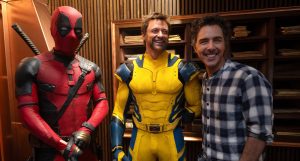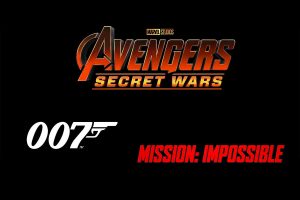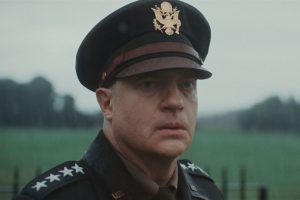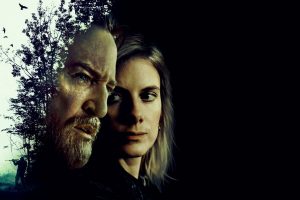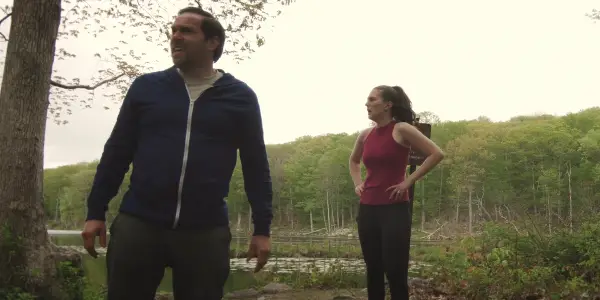
The focus of Dane Elcar’s micro-budget debut feature Brightwood is a relationship falling apart. Jen (Dana Berger) and Dan (Max Woertendyke) hate each other, their discontent radiating off of them as they jog together one morning. Dan says it’s the only alone time they spend together anymore. And frankly, that sucks, right off the bat. Jogging is annoying enough to do alone, doubly so when you’ve got the ulterior motive of saving your marriage.
The universe throws Jen and Dan a “fuck you” curveball when Jen takes them along the loop trail at a local pond… the time loop trail! *shoots self*
Welcome To The Time Loop
The pond trail turns out to be the same 100 feet repeated over and over. As Jen and Dan keep passing by the same “No Swimming” sign, the same dingy trash bin, and the same ominous hooded person, things get tense. They can’t run through the woods — it just spits them back out at the loop trail. They can’t swim across — the sign says “no swimming,” after all. (Though I’m surprised neither of them tried it.) It’s a good allegory for jogging, come to think of it — the sensation of being trapped in a sweaty hell forever — but an even better one for a failing marriage.
source: Cinephobia Releasing
In the small but thriving time loop sci-fi genre, one of the perks is watching your protagonists die again and again and again. Bill Murray enters his suicide era after, like, 100 days trapped in Punxsutawney, and the main character dies every couple of minutes in Happy Death Day. So it’s inevitable that Jen and Dan start dying a few loops in, and they keep dying until the end credits. It’s a potent metaphor for a toxic relationship, where being with someone is at once inescapable but also feels like dying a little bit every day.
Indie Filmmaking!!
Staging your time loop around a lake trail is as practical and bare-bones as it is smart and compelling. Every loop, the film seems to expand on its time loop concept, exploring what else its characters can do and diving further into their dynamic. Just as Elcar uses the conceit of the time loop to dig deep into his characters, it seems his creative process was the same. With almost no budget to work with — Brightwood was made for $14,000 — Elcar tunnels downward into his diegesis and characters rather than building up in plot and special effects. As a result, Brightwood might not have the flashy presentation of a time loop film like Timecrimes or Triangle, but under the surface you can sense a rich foundation of character, theme, and concept.
Lots of low-budget sci-fi filmmaking takes a “write smarter, not harder” approach to its stories, from the labyrinthine time travel mechanics of Primer to the tense gender dynamics of Perfectly Good Moment. Elcar’s Brightwood reminds me of a really smart Japanese film from 2020 called Beyond the Infinite Two Minutes, in which the folks at a small café learn that their boss’s computer monitor, which is linked to the café’s television, is showing them things that will happen two minutes in the future.
Beyond the Infinite Two Minutes takes place predominantly indoors, and it’s choreographed and edited to appear as one long continuous shot. While it’s more technically adventurous and formally daring than Elcar’s film, Brightwood deserves major props for opting to shoot exclusively outdoors. Elcar — who also edited and shot the film — provides us with plenty of coverage of the woods and these two poor souls lost within it. The two-shots with Berger and Woertendyke play beautifully, with Elcar’s keen direction and attention to his actors allowing them to find complicated emotional beats within the pretty sparse canvas that Brightwood concocts.
source: Cinephobia Releasing
On the whole, though, while Brightwood excels narratively, its visuals let a little stuffing out of the teddy bear. There are frays in the filmmaking itself that might make Brightwood a hard film to recommend to people who don’t usually watch nano-budget films. While it’s all shot well enough to tell the story, Brightwood’s visual style unfortunately, for me, didn’t match its storytelling panache, and the pretty standard shots Elcar chose — alongside the rote color grading — left me longing for a stronger commitment to inventive composition and a more assertive visual identity for Brightwood.
Down, Down The Droste
The more accurate translation of Beyond the Infinite Two Minutes’ Japanese title is “We at the End of the Droste.” It refers to a practice of mise en abyme in art — images within images, like when you stand between two mirrors and seem to expand into infinity. The Droste effect is named for Droste cocoa powder tins, which show a nurse carrying a tray with a cocoa powder tin, and on that cocoa powder tin is a nurse carrying a tray with a cocoa powder tin, and on that… you get the idea.
Brightwood’s characters tumble down the Droste with each loop. It’s not very narratively satisfying to see them never really learn why they’re trapped there or what the rules of Brightwood are, but that lack of control is also the point. The resolution of a time loop movie — Groundhog Day and Edge of Tomorrow, for instance — normally involves the hero figuring out a way to control the loop and ultimately escape it. They get the girl, save the day, whatever. They get to see tomorrow. Jen and Dan never get there. Instead, they only get more pissed off at each other the longer the loop goes on.
Told largely in real time — whatever that means for a story about a time loop — Brightwood’s most interesting element is ultimately not its sci-fi set-up, but rather the shrewd characters caught in its web. The emphasis on realistic dialogue and believable characters within the pragmatic style makes Brightwood different than its bigger-budgeted time loop movie cousins.
Details about Jen and Dan’s relationship are teased out over the course of the film. The screenplay mollifies the intense situation with Jen’s aggravation and Dan’s ill-timed humor. A mid-film argument in the woods has the tone of that famous Marriage Story confrontation. Everything after that scene brings a curious world-weariness to their dynamic that makes Jen and Dan very rewarding characters to watch, and Berger and Woertendyke are more than game to keep unearthing new layers to their roles. No matter what hurdles Elcar’s script throws at them, Berger and Woertendyke are two wonderful performers who fill this sci-fi mystery with sass, levity, and realism.
source: Cinephobia Releasing
My only gripe with their characterizations is that the two of them, especially Jen, seem to lose their minds way too quickly. They’re only a few loops in before Jen is screaming at the pond and mumbling under her breath and Dan is yelling at the trash bin. While the characters evolve, the parameters are much more limited and the drama more grounded than in other time loop dramas.
Conclusion: Brightwood
Brightwood is more than the sum of its parts, a sci-fi story that manages to invest energy and care in its characters rather than just in its timey-wimey mechanics. The feature, adapted from a short that Elcar made previously, retains that short-film vibe to it, but the doomed relationship at the core gives this story a good ticking time bomb element, and I’m always game to see a time loop story done well.
This was also shot in New Jersey, so the New Jersey native and young filmmaker in me fondly remembers running around the woods with a camera, setting up a tripod in the mud, and finding interesting ponds, rivers, and lakes to shoot around, wondering what stories I could possibly tell there that wouldn’t require me to sell plasma or a kidney to bring them to life. Elcar made a beautiful mystery with Brightwood, and I eagerly look forward to whatever he’s working on next.
Brightwood is currently streaming on Vudu and is available to rent on Amazon Prime and other streaming services.
Does content like this matter to you?
Become a Member and support film journalism. Unlock access to all of Film Inquiry`s great articles. Join a community of like-minded readers who are passionate about cinema – get access to our private members Network, give back to independent filmmakers, and more.

